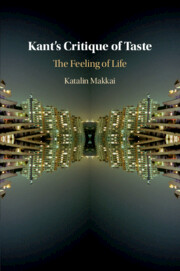Book contents
- Kant’s Critique of Taste
- Kant’s Critique of Taste
- Copyright page
- Contents
- Acknowledgments
- Note on Citations
- Introduction
- Chapter 1 The Art of Judgment
- Chapter 2 Communication and Animation in the Judgment of Taste
- Chapter 3 Subjectivity and Recognition in the Judgment of Taste
- Chapter 4 Modes of Attunement
- Chapter 5 Aesthetic Liking
- Bibliography
- Index
Introduction
A Twofold Peculiarity
Published online by Cambridge University Press: 07 April 2021
- Kant’s Critique of Taste
- Kant’s Critique of Taste
- Copyright page
- Contents
- Acknowledgments
- Note on Citations
- Introduction
- Chapter 1 The Art of Judgment
- Chapter 2 Communication and Animation in the Judgment of Taste
- Chapter 3 Subjectivity and Recognition in the Judgment of Taste
- Chapter 4 Modes of Attunement
- Chapter 5 Aesthetic Liking
- Bibliography
- Index
Summary
This introductory chapter motivates and sketches the book’s approach. The chapter identifies the heart of the problem that the judgment of taste poses in terms of its apparent presumptuousness in demanding pleasure. Many scholars read Kant’s Critique of Judgment as adumbrating an account of the aesthetic that has little connection with our actual aesthetic experiences or with our ways of explaining and supporting aesthetic judgments. Among art historians, critics, and theorists, Kant is regarded as the source of a distorting notion of the aesthetic that chooses affect or pleasure over meaning. For example, Kantian aesthetics is widely taken to entail a specific approach to art criticism, viz. a narrow formalism. My interpretation aims to show that the judgment of taste is a contentful engagement with an object the terms of which are not specifiable in advance. To enter a judgment of taste is to expose one’s sense of what matters. This is why a risk of presumptuousness is characteristic of the judgment of taste. It is also why the judgment of taste is exemplary of judgment generally
Keywords
- Type
- Chapter
- Information
- Kant's Critique of TasteThe Feeling of Life, pp. 1 - 33Publisher: Cambridge University PressPrint publication year: 2021



